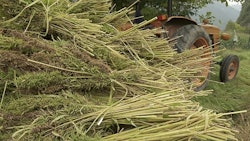
While the Agriculture Improvement Act of 2018 (the 2018 Farm Bill) federally legalized hemp, it did not legalize the plant’s nearly identical counterpart, marijuana. The two remain differentiated by their concentration of tetrahydrocannabinol (THC)—any cannabis with 0.3% THC or less is hemp, and anything above is marijuana.
So when the Wyoming Division of Criminal Investigation (WDCI) raided a hemp farm in November of 2019 and found the crops contained up to 0.6% THC—just slightly above the legal limit—the mother-son duo who ran the farm, Debra Palm-Egle and Joshua Egle, along with contractors who were on the property at the time, faced several criminal charges and prison time.
A judge in Laramie County, Wyo., recently threw out the case during the preliminary hearing, finding prosecutors lacked probable cause that the Egles intended to grow and distribute marijuana.
Despite the dropped charges, legal experts say the case demonstrates the legal gray area that has come about in enforcing marijuana laws since hemp’s legalization.
Case Details
The WDCI became aware of the Egles’ farm through a tip from a neighbor who was concerned they were growing marijuana, according to WyoFile.
The outlet reports the dramatic scene that unfolded during the raid in November. The Egles were not home, but the contractors—married couple Brock and Shannon Dykes—were caring for the farm while the Dykes’ two children were inside the house. The Dykes saw a line of unmarked cars and a Wyoming Highway Patrol car drive toward the property.
WyoFile reports agents came out of their cars in tactical gear with rifles pointed at the couple and ordered them to “put their f---ing hands up.” Several officers also stormed the house.
The agents seized 722 pounds of cannabis and tested it for THC levels. Nine out of ten of the tests taken showed the crops contained more than 0.3% THC—but none contained more than 0.6% THC.
RELATED: New Law Enforcement Challenges: Is It Marijuana or Hemp?
Prosecutors sought to charge the Egles and the Dykes with conspiracy to manufacture, deliver or possess marijuana; possession with intent to deliver marijuana; possession of marijuana and planting or cultivating marijuana. All but the final charge are felonies, and the farmers faced up to decades in prison.
But prosecutors had a weighty task: They needed to prove beyond a reasonable doubt that the Egles had intended to grow marijuana, says Nadav Ascher, a partner at The Rodman Law Group based in Denver. For prosecution, many criminal offenses require not just an illegal action to be committed, but also proof that the suspects intended to commit that illegal action.
To this end, the odds were stacked against prosecutors. The Egles had been outspoken about hemp cultivation prior to its legalization in the state, according to WyoFile. They were also growing cannabis with a THC level far lower than what is sold at a typical dispensary, or even in the black market.
“The Egles spoke publicly and at length about their intent to grow hemp, not marijuana,” Ascher says. “The confiscated plants contained only 0.6% THC, which is well below the potency of what is commercially sold as marijuana. If you walk into a dispensary and they sell flower at 1% THC content or less, you can bet the farm that the dispensary won’t be around for very long.”
While Wyoming had not yet developed regulations for hemp cultivation when the Egles were raided, and they were growing without a producer license, Laramie County Circuit Court Judge Antoinette Williams dismissed the case Aug. 6, WyoFile reports. They could still face a $750 fine for growing without a license, but it’s far from the criminal charges the mother-son duo faced.
Brock Egle told the outlet the farmers were growing hemp as research before Wyoming’s regulations were in place.
“Thank God it’s over,” Palm-Egle said when the charges were dropped, WyoFile reports.
A New Trend
The Egles’ case represents a growing number of law enforcement and legal challenges likely to come with the passage of the 2018 Farm Bill. Not only is it impossible to distinguish hemp or marijuana with the naked eye, making it difficult for law enforcement in the field—but also, prosecutors could have difficulty proving the grower had intended on cultivating marijuana, Ascher says.
“I expect that many pending marijuana cases will be dismissed, or that prosecutors will be more willing to entertain softer plea deals that benefit defendants,” Ascher says. “This was an unintended consequence of the 2018 Farm Bill, this legal gray area of cultivation of hemp as a defense to a marijuana charge. We hope we now are witnessing a shift in outdated and unfair criminal enforcement priorities, to priorities more in line with the public’s general support of cannabis.”
Editors Note: Hemp Grower’s September/October issue will feature more on how the passage of the 2018 Farm Bill could complicate marijuana prosecutions.























